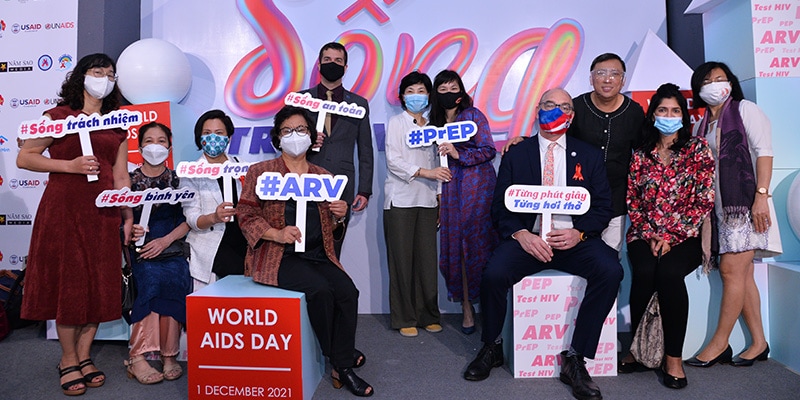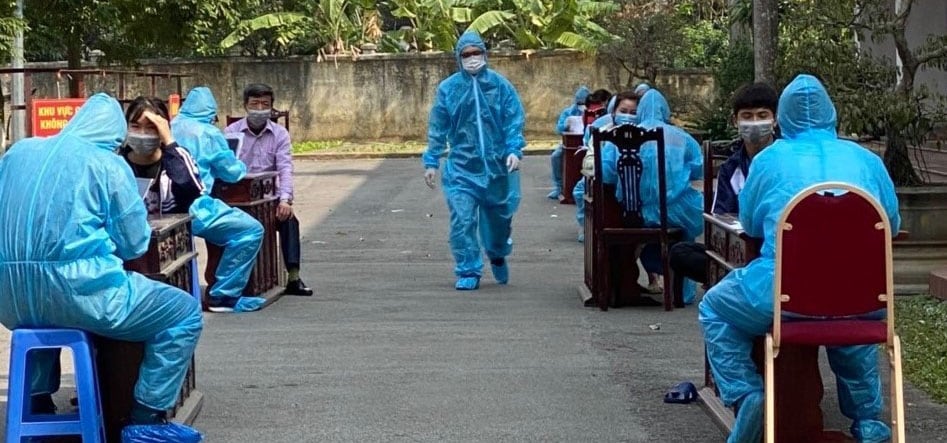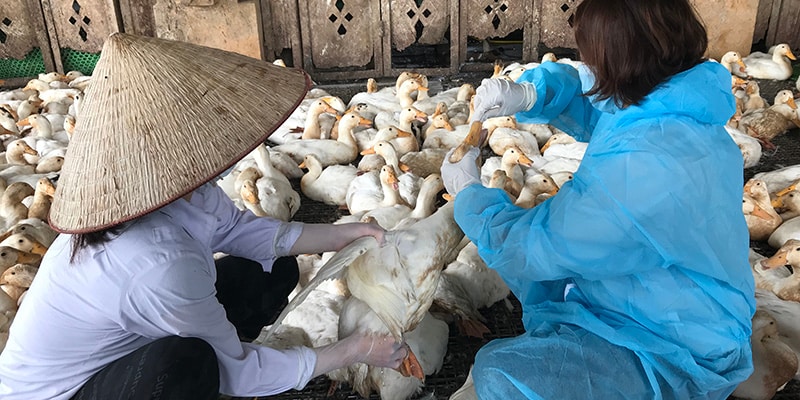CDC in Vietnam

CDC supports Vietnam’s Field Epidemiology Training Program, which trains epidemiologists to become disease detectives who prevent, detect, and respond to outbreaks, including COVID-19. Photo by Diep Thi Bich Vu/CDC Vietnam.
The Centers for Disease Control and Prevention (CDC) has worked with the government of Vietnam since 1998 and is celebrating 25 years of partnership in 2023. CDC provides direct technical support and expertise to the Vietnam Ministry of Health (MOH) to build high-quality, sustainable public health systems and scale up programs that address priority diseases, including HIV, tuberculosis (TB), and influenza. CDC collaborates with the government of Vietnam to strengthen laboratory and surveillance systems to prevent antimicrobial resistance, infections in healthcare settings, and zoonotic and vaccine-preventable diseases. CDC also supports epidemic preparedness and response, helps expand local public health workforce capacity, and provides guidance on emergency management systems that strengthen global health security.
Global Health Security
CDC’s global health security efforts in Vietnam enhance the country’s ability to prevent, detect, and respond to infectious disease outbreaks faster. These efforts help Vietnam reach the goals outlined in the Global Health Security Agenda (GHSA). CDC works with the government of Vietnam and partners to support:
- Workforce development, including the Field Epidemiology Training Program (FETP)
- Early reporting of disease outbreaks
- Prevention of disease transmission and infection in hospitals
- Strengthening biosafety to protect laboratory workers
- Strengthening biosecurity to prevent the public from accidental or deliberate release of pathogens
- Reducing illnesses and deaths due to antimicrobial resistance
- Strengthening Vietnam’s immunization program
CDC helped establish a network of five emergency operations centers (EOCs) to coordinate effective responses when crises occur. These EOCs supported Vietnam’s COVID-19 response
In 2018, CDC supported the MOH to develop and issue national guidelines for event-based surveillance, which is now routine in Vietnam
As of 2022, CDC has helped develop a surveillance system for healthcare-associated infections in 50 hospitals
More than 250 surveillance staff graduated from the 3-month FETP-Frontline since 2019. Seven trainees graduated from the 9-month FETP-Intermediate since 2021
The 12-month FETP-Advanced will launch in 2023
As a key implementer of the U.S. President’s Emergency Plan for AIDS Relief (PEPFAR), CDC works with health agencies in Vietnam to reach HIV epidemic control. CDC leads the response to HIV, collaborating with the MOH and local partners to institutionalize and standardize biomedical and scientific innovations within the public health system. CDC also strives to eliminate stigma and discrimination associated with HIV.
To control HIV and TB, CDC staff:
- Provide technical support to the MOH, academic institutions, provincial HIV programs, community organizations, and the private sector
- Support high-quality and innovative service delivery
- Strengthen HIV lab and diagnostic capabilities
- Enhance HIV surveillance, epidemiology, and program monitoring
- Work with communities living with or affected by HIV to ensure equity and people-centered service delivery approaches
- Support Vietnam’s National TB Program to find, cure, and prevent TB, HIV-associated TB, and multidrug-resistant TB
- Help strengthen the country’s capacity to operationalize TB prevention and control tools, build the evidence for enhanced TB control and prevention, and use data to drive decision-making

U.S. Embassy and CDC Vietnam representatives pose at an event for World AIDS Day in 2021. The event was an opportunity to promote safe and effective treatment for HIV. Photo credit: VNP+
With CDC’s support through PEPFAR, the number of provinces with HIV sentinel surveillance sites increased from 20 to 40 since 2003. These sites help Vietnam better track patterns of infection
By the end of September 2021, all 58 (100%) CDC-supported sites started same-day HIV treatment for newly diagnosed patients
As of 2022, 98% of patients on CDC-supported HIV treatment achieved undetectable viral loads, which is among the highest percentage in the world. This means that patients cannot transmit HIV to sexual partners
Through CDC support, Vietnam became the first PEPFAR country to issue communication guidelines focused on how HIV is not transmittable when viral load is undetectable. This messaging is critical to dismantling HIV stigma and discrimination
CDC and partners conducted a landmark clinical trial for a TB treatment regimen that shortens treatment from 6 months to 4 months. This was the first new TB treatment regimen globally in over 30 years
In 2021, CDC supported Vietnam to introduce a new and shorter TB preventive therapy regimen for people living with HIV
CDC supported the development of robust HIV testing diagnostics and national external quality assurance systems for more than 930 HIV testing laboratories
During COVID-19, CDC helped the MOH implement novel HIV service delivery strategies, including telemedicine, to support HIV treatment continuity and access to life-saving medicine and supplies. CDC helped deliver 5,000 home-based care packages for people living with HIV
A CDC-supported systematic TB screening strategy tripled TB diagnoses among people living with HIV. This strategy enhances rapid detection and notification of TB cases in Vietnam
Laboratory Capacity Building
CDC’s initial support to strengthen laboratory quality management systems to diagnose, monitor, and prevent HIV, TB, and influenza has expanded to a range of infectious diseases. CDC helped Vietnam develop national strategic plans, a public health reference laboratory network, a biosafety and biosecurity system, and strengthened data sequencing. CDC also helps scale up HIV diagnostics, routine viral load monitoring, and innovations such as recency testing and TB diagnostics. CDC also facilitates collaboration between human and animal health laboratories to ensure that both can detect novel respiratory viruses with pandemic potential. Annually, over 5,000 samples from hospitalized patients in Vietnam are tested for influenza viruses and seven other viral respiratory pathogens. Human and poultry with positive influenza A results are sent to the World Health Organization (WHO) Collaborating Center at CDC for further characterization and potential inclusion as candidate vaccine strains.
As of 2023, CDC helped develop a surveillance system for antimicrobial resistant pathogens that is used in 54 laboratories across the country
Since 2012, CDC supported 26 medical laboratories to obtain international accreditation for HIV, TB, influenza, dengue, and other clinical testing
In 2017, CDC established a national public health reference laboratories network in three major cities, which supports state-of-the-art diagnostic capacities and the ability to characterize new diseases with genetic fingerprinting
Over the past 10 years, CDC supported the implementation of external quality assurance programs for TB diagnostic tests and transferred the technology to the Vietnam National TB Reference Laboratory. This laboratory is now a regional resource that services five additional countries
Implementation of an electronic laboratory information system at 32 HIV testing labs has led to faster results and improved data quality
COVID-19 and Pandemic Preparedness
Decades of global health security investments, partnership, HIV and TB control, and pandemic preparedness efforts built strong foundations that Vietnam leveraged to respond to the COVID-19 pandemic. Vietnam was at the forefront of global efforts to detect COVID-19 outbreaks and was a leader in rapid deployment of vaccines, successfully achieving a 95 percent adult vaccination rate for primary doses. CDC’s technical staff continue to partner with the MOH to:
- Develop national guidelines for surveillance, quarantine, laboratory testing, and infection prevention and control (IPC)
- Strengthen laboratory testing so infections can be efficiently and accurately identified
- Provide IPC training to hospital staff to prevent COVID-19 spread
- Assist in investigations to protect communities
- Provide data analysis to the government to make informed decisions
- Provide training on sample collection, biosafety, and testing
- Support vaccine equity, increased demand, and distribution
- Support risk assessments regarding border surveillance and testing requirements

Fellows in CDC’s Vietnam FETP conduct contact tracing interviews during a COVID-19 outbreak in Vinh Phuc province. Photo by Vu Thi Bich Diep/CDC Vietnam
CDC provided training on COVID-19 testing, biosafety, and sample collection at hospitals in all 63 provinces
Since 2020, nearly 3,500 healthcare workers received online trainings on personal protective equipment and COVID-19 IPC
FETP fellows supported two large scale COVID-19 investigations from February-April 2020, which helped Vietnam successfully contain COVID-19 outbreaks for the first 14 months of the pandemic
CDC has partnered with Vietnam to provide support for influenza preparedness since 2005. CDC helped establish two National Influenza Centers that can rapidly detect novel or recurring influenza viruses. CDC supports surveillance of severe acute respiratory infections, influenza-like-illness, and severe viral pneumonia. CDC also strengthens national capacity to detect avian influenza outbreaks, respond to novel viruses in poultry, and continue testing in live bird markets throughout the country.

CDC Vietnam supports ongoing testing of live bird markets to detect and respond to outbreaks of avian influenza. Photo by Ha Thi Nga/CDC
Vietnam licensed its first domestically produced human seasonal influenza vaccine, IVACFLU-S, in January 2019
Between September 2020 and March 2023, Vietnam vaccinated more than 352,000 healthcare workers in 30 provinces with IVACFLU-S
In collaboration with the Partnership for Influenza Vaccine Introduction, CDC is supporting Vietnam to develop a multi-year plan to vaccinate health workers with IVACFLU-S
Due to Vietnam’s and CDC’s surveillance-strengthening efforts, the Department of Animal Health, detected its first in-country cases of H5N8 avian influenza in poultry and live bird markets in June 2021
With CDC technical support, Vietnam detected its first H5 infection since 2014 in October 2022
A CDC-supported hospital-based influenza project identified multiple hospitals around the country that conduct routine influenza testing— primarily rapid testing— and is now collecting samples for PCR subtyping and potential sequencing
- 8 U.S. Assignees
- 62 Locally Employed
- Population: > 99.4 million
- Per capita income: $11,040
- Life expectancy: F 78 / M 69 years
- Infant mortality rate: 10/1,000 live births
Sources: Population Reference Bureau 2022, Vietnam
- Stroke
- Ischemic heart disease
- Diabetes mellitus
- Chronic obstructive pulmonary disease (COPD)
- Tracheal, bronchus, and lung cancer
- Road injuries
- Cirrhosis and other chronic liver diseases
- Chronic kidney disease
- Lower respiratory infections
- Alzheimer’s disease and other dementias
Source: GBD Compare 2019, Vietnam